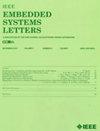利用非线性模型预测控制来控制房屋空调系统
IF 1.7
4区 计算机科学
Q3 COMPUTER SCIENCE, HARDWARE & ARCHITECTURE
引用次数: 0
摘要
根据文献记载,使用楼宇嵌入式控制系统可节约能源(5% 至 20%)。这封信旨在利用神经状态空间预测模型(NSSP)对室内空调系统进行模型预测控制(MPC),以保持室内温度设定点并降低能耗。在此,我们提出了一个高保真模型,并通过使用非线性 MPC 控制的房屋空调系统的实验原型进行了验证。室内空调系统以空调和室内热动态为模型。室外温度由模拟信号和实际测量数据建模。控制器的问题是将室内温度控制在 20 °C 至 22 °C 之间,并最大限度地降低能源成本。与一般的非线性 MPC 控制器相比,多级非线性 MPC 提供了一种更灵活、更高效的方法来实现具有分阶段成本和约束条件的 MPC。本文章由计算机程序翻译,如有差异,请以英文原文为准。
Controlling a House’s Air-Conditioning Using Nonlinear Model Predictive Control
As per literature, there is a potential for energy savings of (5% to 20%) using building embedded control systems. This letter aims to control a house air-conditioning system using model predictive control (MPC) with a neural state space prediction (NSSP) Model to maintain interior temperature set-point and reduce energy consumption. Here, we present a high-fidelity model that is validated by an experimental prototype of a house air-conditioning system that is controlled using a nonlinear MPC. The house air-conditioning system models the air-conditioner and the thermal dynamics of the house. The outdoor temperature is modeled by simulated signals and real measurements. The controller problem is to maintain a house temperature within 20 °C to 22 °C and to minimize energy costs. Compared with the generic nonlinear MPC controller, multistage nonlinear MPC provides a more flexible and efficient way to implement MPC with staged costs and constraints.
求助全文
通过发布文献求助,成功后即可免费获取论文全文。
去求助
来源期刊

IEEE Embedded Systems Letters
Engineering-Control and Systems Engineering
CiteScore
3.30
自引率
0.00%
发文量
65
期刊介绍:
The IEEE Embedded Systems Letters (ESL), provides a forum for rapid dissemination of latest technical advances in embedded systems and related areas in embedded software. The emphasis is on models, methods, and tools that ensure secure, correct, efficient and robust design of embedded systems and their applications.
 求助内容:
求助内容: 应助结果提醒方式:
应助结果提醒方式:


